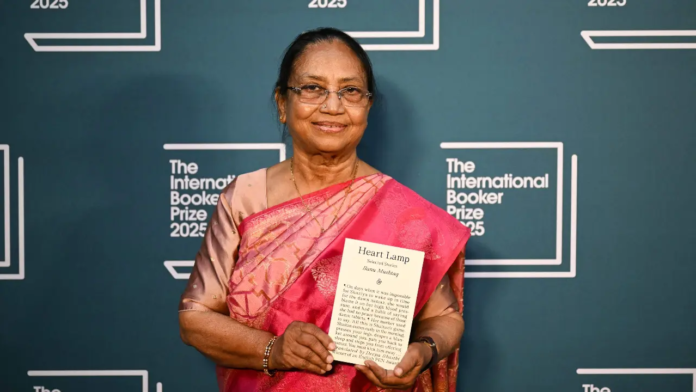In a milestone for regional Indian literature, writer, advocate and activist Banu Mushtaq won the International Booker Prize 2025 for her Kannada short story collection ‘Heart Lamp’ on May 20, becoming the first Kannada author to be awarded the literary honour.
The title, translated by Deepa Bhasthi, is also the first collection of short stories to be awarded the prize.
Originally written and published over a period of 33 years, from 1990 to 2023, the 12 short stories in the book chronicle the resilience, resistance, wit, and sisterhood of women in Muslim communities in southern India.
Who is Banu Mushtaq?
Karnataka-based writer Banu Mushtaq is not only a major voice in progressive Kannada literature, but also a lawyer and activist who has championed women’s rights. The 77-year-old has also voiced her criticism about the caste and class system prevalent in the country.
Her stories are inspired by her personal experiences and everyday conversations. In an interview with The Booker Prizes, she revealed that the social conditions of Karnataka in the 1970s and her direct engagement with the lives of the marginalised communities and women shaped her writing journey.
According to The Booker Prizes website, Mushtaq is the author of six short story collections, a novel, an essay collection and a poetry collection. She has also won other literary honours like the Karnataka Sahitya Academy award and the Daana Chintamani Attimabbe award.
What is ‘Heart Lamp’ about?
‘Heart Lamp’ is a collection of 12 short stories that view women’s lives and rights through an intersection of religion, society and politics.
“My stories are about women -– how religion, society, and politics demand unquestioning obedience from them, and in doing so, inflict inhumane cruelty upon them, turning them into mere subordinates,” Banu Mushtaq said, according to AFP.
Originally published in Kannada language, translator Deepa Bhasthi managed to preserve the multilingual nature of southern India in the translation. When the characters use Urdu or Arabic words in conversation, these are left as it is, reproducing the unique rhythms of spoken language, according to PTI.
Max Porter, International Booker Prize 2025 Chair of judges, described the winning title as something genuinely new for English readers.
“A radical translation which ruffles language, to create new textures in a plurality of Englishes. It challenges and expands our understanding of translation,” he said.


